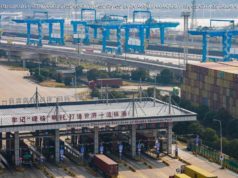China’s U. N. ambassador said Tuesday that multiple North Korean nuclear and ballistic missile tests, with no end in sight, show the «very strong» need for new talks with Pyongyang to reduce tensions and try to achieve denuclearization. …
UNITED NATIONS — China’s U. N. ambassador said Tuesday that multiple North Korean nuclear and ballistic missile tests, with no end in sight, show the «very strong» need for new talks with Pyongyang to reduce tensions and try to achieve denuclearization.
Liu Jieyi, whose country is closest to North Korea, said all progress with North Korea on eliminating nuclear weapons from the Korean peninsula has come through dialogue, «so there’s no reason why dialogue is not taking place in the current situation.»
Liu spoke to reporters after emergency Security Council consultations behind closed doors on the North’s latest missile test.
The United States, Britain and France have been pushing for a new U. N. resolution with tougher sanctions against North Korea.
But Liu said China «first and foremost» wants to see the six sanctions resolutions against North Korea already adopted by the council fully implemented.
«Meanwhile, we should also work to reduce tension, to de-escalate and also to try to achieve denuclearization through dialogue by political and diplomatic means, » he said. «Dialogue should take place because we can only resolve the issue through dialogue.»
The Security Council late Monday strongly condemned North Korea’s «flagrant and provocative defiance» of U. N. sanctions banning ballistic missile tests and again vowed «to closely monitor the situation and take further significant measures including sanctions.»
It also welcomed efforts by council members and others to facilitate «a peaceful and comprehensive solution through dialogue» with North Korea.
Last Friday, North Korea’s deputy U. N. ambassador Kim In Ryong told U. N. correspondents that the government will rapidly strengthen its nuclear strike capability as long as the United States maintains its «hostile policy» toward the country.
He said that if the Trump administration wants peace on the Korean Peninsula it should replace the Armistice Agreement that ended the 1950-53 Korean War with a peace accord and halt its anti-North Korea policy, «the root cause of all problems.»
The Trump administration has said there should be no talks until North Korea takes steps toward getting rid of its nuclear arsenal.
During Tuesday’s Security Council meeting, members were briefed by U. N. political chief Jeffrey Feltman, mainly on technical aspects of the weekend launch.
Uruguay’s U. N. Ambassador Elbio Rosselli, the current council president, said it was the 11th this year «which basically means a quantum leap and determined effort to acquire aggressive capabilities, and that is of major concern.»
Japan’s U. N. Ambassador Koro Bessho told reporters afterward that «North Korea is acting in triumphant and emboldened manner by this most recent launch, and is now clearly demonstrating that it is determined to further bolster its nuclear build-up.»
Calling the provocations «an enormous global threat, » he said «the international community must not leave this total defiance of the Security Council unanswered.»
Bessho said Japan hopes the council will «strengthen the measures and strengthen the sanctions mechanism.»
He said Japan is talking to the U. S., South Korea, and close neighbors Russia and China to make sure pressure on the North is continued «and even strengthened so that North Korea will change its policy.»






